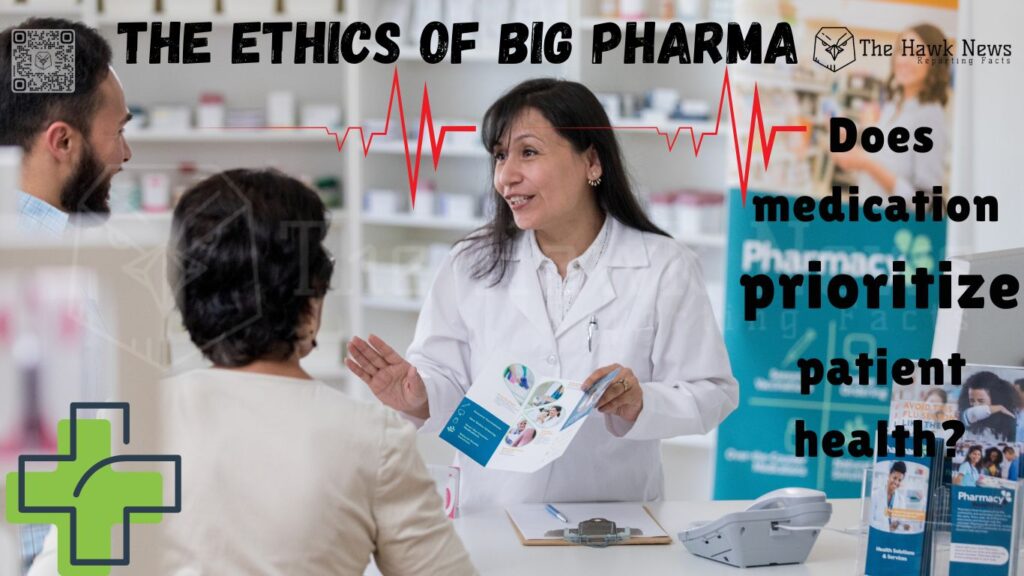
The pharmaceutical industry, commonly referred to as “Big Pharma,” plays an essential role in modern healthcare, producing medications that save lives and enhance the quality of life for millions. However, the motivations behind drug development and the ethics governing this multi-billion-dollar industry are subjects of intense debate.
Are these companies primarily driven by the goal of improving patient health, or is profit the overriding factor? This article delves into the ethical concerns surrounding Big Pharma, exploring the balance between patient welfare and profit in drug development.
The Role of Big Pharma in Healthcare
Pharmaceutical companies have a significant impact on public health by researching, developing, and bringing to market new medications that can cure diseases, alleviate symptoms, and prevent health conditions. The development of life-saving drugs, such as antibiotics, vaccines, and treatments for chronic illnesses like diabetes and hypertension, has transformed medicine and extended human life expectancy.
The research and development (R&D) process in the pharmaceutical industry is complex, costly, and time-consuming. On average, it takes over a decade and billions of dollars to bring a new drug to market.
This high cost is often cited by pharmaceutical companies as justification for the high prices of new medications. The industry’s ability to innovate is crucial, but the question remains: is patient health the primary motivator behind this innovation, or are financial incentives driving the process?
Profit vs. Patient Health: A Tenuous Balance
At the core of the ethical debate surrounding Big Pharma is the tension between the profit motives of pharmaceutical companies and their responsibility to prioritize patient health. On the one hand, companies are businesses that must generate profits to survive, reward shareholders, and fund future research. On the other hand, they provide essential services to society and have a moral obligation to ensure that their products are accessible, safe, and effective.
One of the most significant criticisms leveled against Big Pharma is the prioritization of profit over patient health. This criticism is particularly evident in the pricing of medications. For instance, the cost of life-saving drugs like insulin has skyrocketed in recent years, making it unaffordable for many who need it. This price inflation is often attributed to the monopolistic practices of pharmaceutical companies, which can maintain high prices due to a lack of competition and the patent protection system. The ethical implications are profound, as this practice can lead to patients being unable to afford necessary medications, resulting in preventable suffering and death.
Another area of concern is the focus on developing medications for profitable markets rather than addressing the most pressing global health needs. Diseases that primarily affect low-income populations, such as certain tropical diseases, often receive less attention and funding compared to conditions that are more prevalent in wealthier countries, such as cancer or cardiovascular disease. This disparity raises ethical questions about the priorities of pharmaceutical companies and whether they are truly aligned with global health needs.
The Influence of Marketing and Advertising
The marketing and advertising strategies of pharmaceutical companies further complicate the ethical landscape. In many countries, direct-to-consumer (DTC) advertising of prescription drugs is legal, allowing pharmaceutical companies to market their products directly to the public. While DTC advertising can inform patients about treatment options, it also raises ethical concerns about the potential for misinformation and the promotion of unnecessary medications.
DTC advertising can lead to increased demand for specific drugs, even when they may not be the most appropriate treatment option. This can put pressure on healthcare providers to prescribe medications based on patient requests rather than clinical necessity. Moreover, the influence of pharmaceutical companies on medical professionals through marketing efforts, such as sponsored conferences, gifts, and financial incentives, has raised concerns about conflicts of interest. These practices can lead to biased prescribing patterns, where doctors may favor certain drugs not because they are the best option for the patient but because of the influence of the pharmaceutical company.
The Role of Regulatory Agencies
Regulatory agencies, such as the U.S. Food and Drug Administration (FDA) and the European Medicines Agency (EMA), play a crucial role in overseeing the safety and efficacy of medications. These agencies are responsible for approving new drugs based on rigorous testing and clinical trials. However, the relationship between regulatory agencies and pharmaceutical companies is not without controversy.
Critics argue that the close ties between regulatory agencies and the pharmaceutical industry can lead to conflicts of interest. For example, the revolving door phenomenon, where individuals move between jobs in regulatory agencies and the pharmaceutical industry, can create a situation where regulators may be more lenient towards companies they once worked for or may hope to work for in the future. Additionally, the reliance of regulatory agencies on funding from the pharmaceutical industry, such as through user fees paid by companies to have their drugs reviewed, raises concerns about the independence of these agencies.
Despite these concerns, regulatory agencies are essential in ensuring that new medications are safe and effective. Strengthening the independence and transparency of these agencies is crucial to maintaining public trust and ensuring that patient health remains the top priority in the drug approval process.
The Impact of Patent Laws and Market Exclusivity
Patent laws and market exclusivity are critical components of the pharmaceutical industry’s business model. Patents provide companies with the exclusive right to sell a new drug for a certain period, typically 20 years from the date of filing. This exclusivity allows companies to recoup the costs of research and development and make a profit before generic versions of the drug can enter the market.
However, the patent system has also been criticized for contributing to high drug prices and limiting access to medications. Pharmaceutical companies have been accused of “evergreening,” a practice where they make slight modifications to existing drugs to extend their patent protection and delay the entry of cheaper generic alternatives. This practice can keep drug prices high for longer periods, making essential medications unaffordable for many patients.
The ethical implications of patent laws are particularly evident in the case of life-saving medications. When patients cannot access affordable generic versions of drugs due to patent protection, it raises serious ethical concerns about the balance between rewarding innovation and ensuring access to essential medicines.
Moving Towards a Patient-Centered Approach

While the profit motive is an inherent part of any business, including the pharmaceutical industry, there is a growing call for a more patient-centered approach to drug development. This approach would prioritize patient health and access to medications over maximizing profits.
One potential solution is to increase public funding for pharmaceutical research, reducing the reliance on private companies to drive innovation. Publicly funded research could focus on addressing the most pressing global health needs, rather than prioritizing more profitable conditions. Additionally, increased transparency in drug pricing and the elimination of unethical marketing practices could help ensure that medications are developed and distributed with patient health in mind.
Another important step is strengthening the role of regulatory agencies in ensuring that the approval and pricing of new drugs are guided by the best interests of patients. This could involve stricter regulations on the relationships between pharmaceutical companies and healthcare providers, as well as more rigorous oversight of drug pricing practices.
Conclusion
The ethics of Big Pharma is a complex and multifaceted issue, with significant implications for public health and patient welfare. While the pharmaceutical industry has made remarkable contributions to medicine and has the potential to continue improving global health, there is a need for greater accountability and a stronger emphasis on patient-centered practices. By addressing the ethical concerns surrounding profit-driven motives, marketing practices, and the influence of patent laws, society can work toward a pharmaceutical industry that truly prioritizes patient health over profits.